英语被动句的翻译
- 格式:pptx
- 大小:2.35 MB
- 文档页数:15
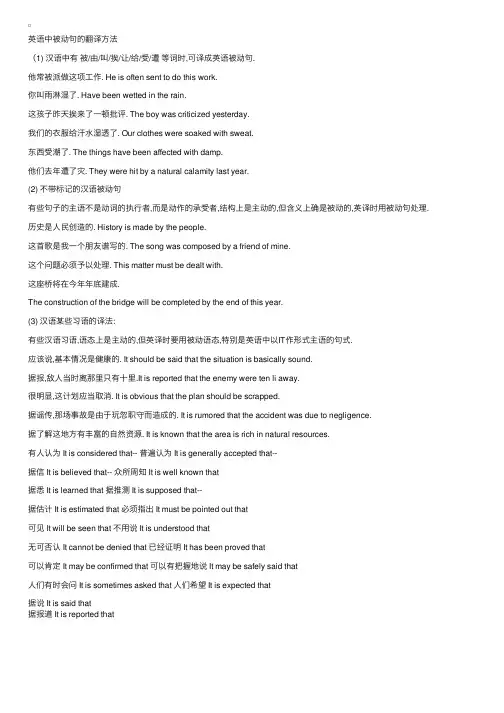
英语中被动句的翻译⽅法(1) 汉语中有被/由/叫/挨/让/给/受/遭等词时,可译成英语被动句.他常被派做这项⼯作. He is often sent to do this work.你叫⾬淋湿了. Have been wetted in the rain.这孩⼦昨天挨来了⼀顿批评. The boy was criticized yesterday.我们的⾐服给汗⽔湿透了. Our clothes were soaked with sweat.东西受潮了. The things have been affected with damp.他们去年遭了灾. They were hit by a natural calamity last year.(2) 不带标记的汉语被动句有些句⼦的主语不是动词的执⾏者,⽽是动作的承受者,结构上是主动的,但含义上确是被动的,英译时⽤被动句处理.历史是⼈民创造的. History is made by the people.这⾸歌是我⼀个朋友谱写的. The song was composed by a friend of mine.这个问题必须予以处理. This matter must be dealt with.这座桥将在今年年底建成.The construction of the bridge will be completed by the end of this year.(3) 汉语某些习语的译法:有些汉语习语,语态上是主动的,但英译时要⽤被动语态,特别是英语中以IT作形式主语的句式.应该说,基本情况是健康的. It should be said that the situation is basically sound.据报,敌⼈当时离那⾥只有⼗⾥.It is reported that the enemy were ten li away.很明显,这计划应当取消. It is obvious that the plan should be scrapped.据谣传,那场事故是由于玩忽职守⽽造成的. It is rumored that the accident was due to negligence.据了解这地⽅有丰富的⾃然资源. It is known that the area is rich in natural resources.有⼈认为 It is considered that-- 普遍认为 It is generally accepted that--据信 It is believed that-- 众所周知 It is well known that据悉 It is learned that 据推测 It is supposed that--据估计 It is estimated that 必须指出 It must be pointed out that可见 It will be seen that 不⽤说 It is understood that⽆可否认 It cannot be denied that 已经证明 It has been proved that可以肯定 It may be confirmed that 可以有把握地说 It may be safely said that⼈们有时会问 It is sometimes asked that ⼈们希望 It is expected that据说 It is said that据报道 It is reported that。
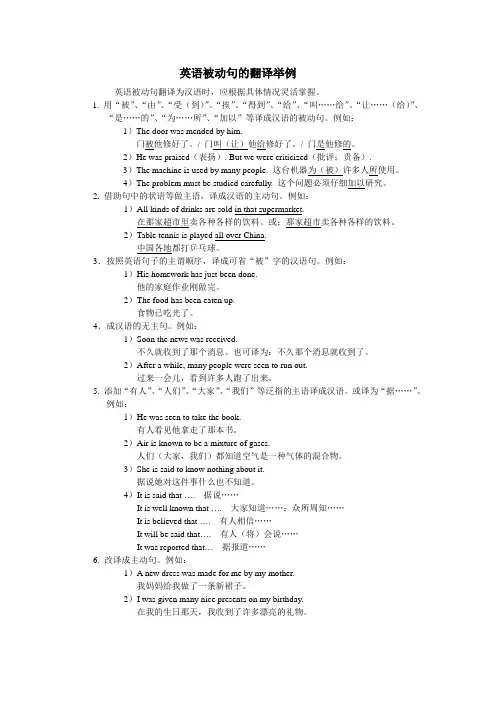
英语被动句的翻译举例英语被动句翻译为汉语时,应根据具体情况灵活掌握。
1. 用“被”、“由”、“受(到)”、“挨”、“得到”、“给”、“叫……给”、“让……(给)”、“是……的”、“为……所”、“加以”等译成汉语的被动句。
例如:1)The door was mended by him.门被他修好了。
/ 门叫(让)他给修好了。
/ 门是他修的。
2)He was praised(表扬). But we were criticized(批评;责备).3)The machine is used by many people. 这台机器为(被)许多人所使用。
4)The problem must be studied carefully. 这个问题必须仔细加以研究。
2. 借助句中的状语等做主语,译成汉语的主动句。
例如:1)All kinds of drinks are sold in that supermarket.在那家超市里卖各种各样的饮料。
或:那家超市卖各种各样的饮料。
2)Table tennis is played all over China.中国各地都打乒乓球。
3.按照英语句子的主谓顺序,译成可省“被”字的汉语句。
例如:1)His homework has just been done.他的家庭作业刚做完。
2)The food has been eaten up.食物已吃光了。
4.成汉语的无主句。
例如:1)Soon the news was received.不久就收到了那个消息。
也可译为:不久那个消息就收到了。
2)After a while, many people were seen to run out.过来一会儿,看到许多人跑了出来。
5. 添加“有人”、“人们”、“大家”、“我们”等泛指的主语译成汉语。
或译为“据……”。
例如:1)He was seen to take the book.有人看见他拿走了那本书。
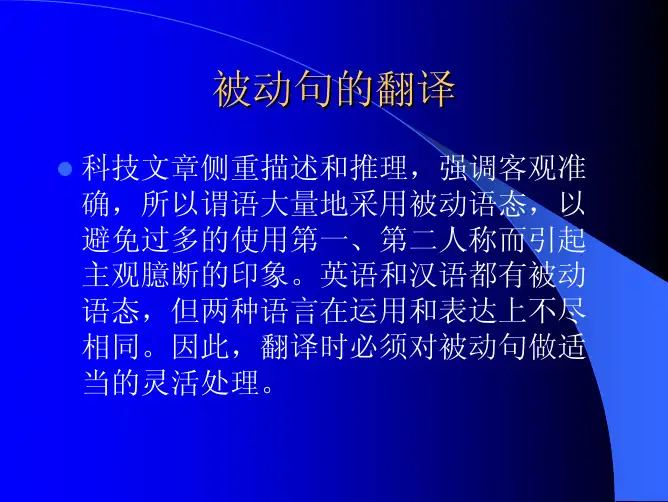

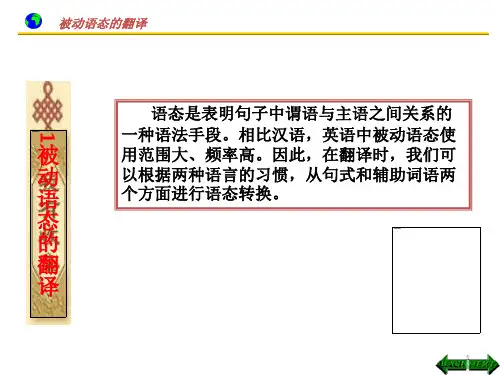
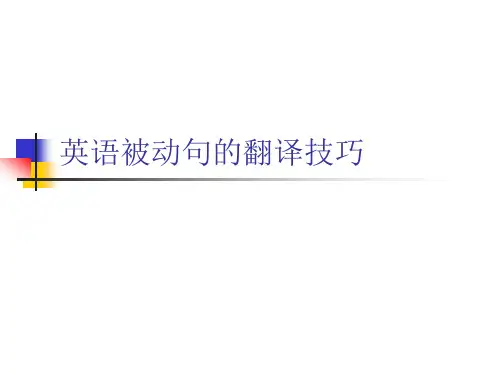
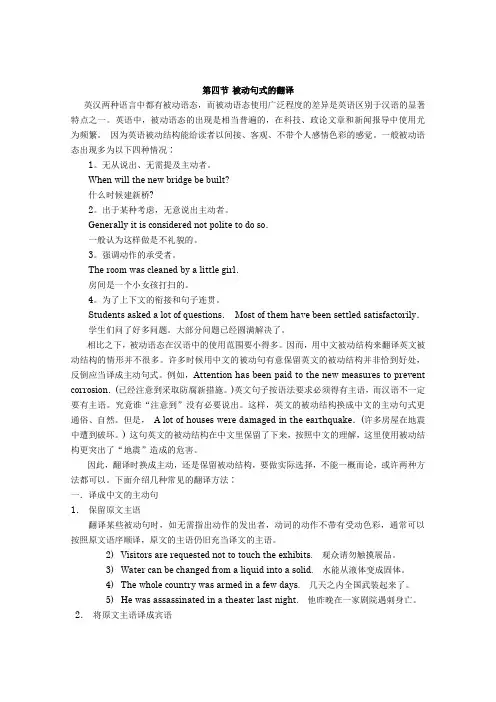
第四节被动句式的翻译英汉两种语言中都有被动语态,而被动语态使用广泛程度的差异是英语区别于汉语的显著特点之一。
英语中,被动语态的出现是相当普遍的,在科技、政论文章和新闻报导中使用尤为频繁。
因为英语被动结构能给读者以间接、客观、不带个人感情色彩的感觉。
一般被动语态出现多为以下四种情况∶1。
无从说出、无需提及主动者。
When will the new bridge be built?什么时候建新桥?2。
出于某种考虑,无意说出主动者。
Generally it is considered not polite to do so.一般认为这样做是不礼貌的。
3。
强调动作的承受者。
The room was cleaned by a little girl.房间是一个小女孩打扫的。
4。
为了上下文的衔接和句子连贯。
Students asked a lot of questions.Most of them have been settled satisfactorily.学生们问了好多问题。
大部分问题已经圆满解决了。
相比之下,被动语态在汉语中的使用范围要小得多。
因而,用中文被动结构来翻译英文被动结构的情形并不很多。
许多时候用中文的被动句有意保留英文的被动结构并非恰到好处,反倒应当译成主动句式。
例如,Attention has been paid to the new measures to prevent corrosion.(已经注意到采取防腐新措施。
)英文句子按语法要求必须得有主语,而汉语不一定要有主语。
究竟谁“注意到”没有必要说出。
这样,英文的被动结构换成中文的主动句式更通俗、自然。
但是,A lot of houses were damaged in the earthquake.(许多房屋在地震中遭到破坏。
) 这句英文的被动结构在中文里保留了下来,按照中文的理解,这里使用被动结构更突出了“地震”造成的危害。

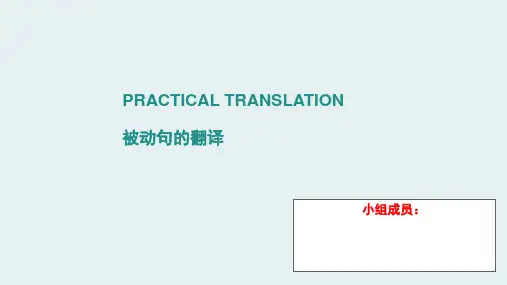

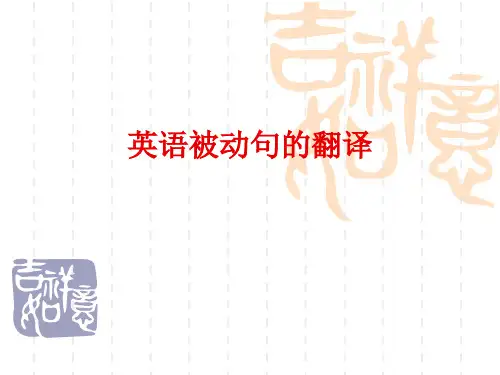
科技英语中使用大量的被动语态Attention must be paid to the working temperature of the machine.应当注意机器的工作温度。
而很少说:You must pay attention to the working temperature of the machine .你们必须注意机器的工作温度。
(1) It has been calculated that only 1/10, 000 part of the energy radiated annually form the sun is taken up by plants. 据计算,太阳每年辐射(到地球上)的能量只有0.01%被植物吸收。
(植物)( 2) It was found that one of the culture dishes in which colonies of the bacteria (细菌群体) were growing had been contaminated by a colony of another organism, a mould of penicillin. 结果发现在一个培养液中正在生长的细菌菌落受到另一种菌落的感染,这种菌落就是青霉菌。
青霉菌菌落感染了一个正在培养液中生长的细菌菌落。
(微生物)(3) The surface of a metal is attacked by various gases in the atmosphere. 金属的表面受到大气中各种气体的侵蚀。
(自然现象)(4) Each of the body systems is regulated in some way by some part of the endocrine system(内分泌系统). 人体的每个系统都在某一方面由内分泌的某一腺体进行调节。
(生理现象)( 5 ) Large quantities of fuel are required by modern industry. 现代工业需要大量的燃料。
英语被动句的翻译英语被动句的翻译1. The oil of the world will have been used up, and man will be using the more convenient power obtained from the splitting of the atom.全世界的⽯油将会⽤尽,⼈们将使⽤从原⼦裂变中获得的这种更为⽅便的动⼒。
2. Since the first test of the atomic bomb the world has learnt the atom can be split and its power can be used.⼈们从第⼀次原⼦弹的测试中知道了原⼦可以分裂,原⼦能可以使⽤。
3. A link-up of computers could mean that a large amount of information will be supplied to anyone who uses the system.将电脑连接起来意味着,使⽤该系统的⼈可以得到⼤量的信息。
4. The expansion of metals on heating must be taken into consideration before a long metal bridge is built.在建造⼀座⼤桥前,必须考虑到⾦属受热膨胀这⼀因素。
5. The Wright brothers were highly praised for having made the first flight in the world.莱特兄弟因为进⾏了世界第⼀次飞⾏⽽为⼈称道。
6. High voltage current is usually carried by overhead wire system so as to prevent living things being electrocuted.为了防⽌⼈畜触电,⾼压电⼀般采⽤⾼架线传送。
被动语态翻译英语中被动语态使用范围很广,凡是在不必或不愿说出或无从说出施动者以及为了便于连贯上下文或者为了强调动作的承受者等场合,往往都用被动语态。
英语被动句的翻译主要有以下几种情况:一、译成汉语主动句。
1.原句中的主语、谓语不变,译文中没有表示被动的标志,如“被、把”字等,形式上是主动句,表达被动意义。
例如:Eg. On Practice has been translated into many foreign languages. 《实践论》已译成许多国家的文字。
Eg. The whole country was armed in a few days. 几天以内,全国就武装起来了。
2.原句中的主语移到谓语之后,译作宾语。
Eg. Another middle school has been set up in our district.我们区又办了一所中学。
Eg. 1,200 people had been saved soldiers in the earthquake. 在地震中,战士们已救出1200人。
3.译成带表语的主动句。
Eg. The decision to attack was not taken lightly. 进攻的决定不是轻易作出的。
Eg. In the old society,women were looked down upon. 在旧社会,妇女们是受歧视的。
4.含主语从句的被动句型译为主动句。
以it作形式主语的英语句子,翻译时常要转为主动形式,有时可加上“有人”、“大家”、“我们” 等不确定主语。
例如:Eg. It is reported that the enemy has been breeding new strains of killer viruses.据报道敌人正在培育新的杀人病毒。
Eg. It is suggested that meeting be put off till next Monday.有人建议会议推迟到下星期一举行。